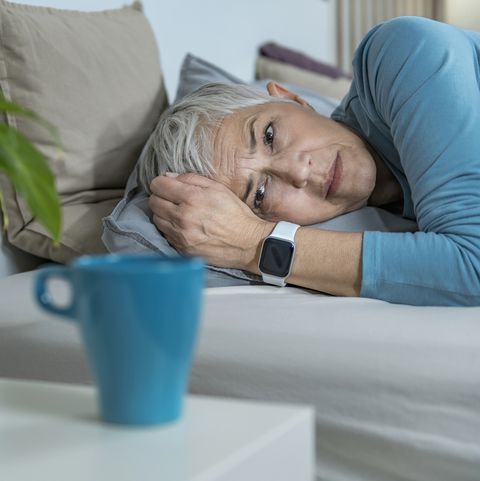Do you have trouble sleeping at night? If so, you’re not alone. Millions of people around the world suffer from insomnia every year. There are many different causes of insomnia, and fortunately, there are also many different cures. In this blog post, we will discuss what insomnia is, what causes it, and how to cure it. We hope that by reading this post, you will be able to get a good night’s sleep and feel refreshed and energized in the morning!
Contents
What Is Insomnia?
 Insomnia is a sleep disorder that is characterized by difficulty falling or staying asleep. It is often accompanied by daytime fatigue, poor concentration, and irritability. This sleep disorder is very common, affecting about 30% of adults. It can occur at any age but is most common in middle-aged and older adults.
Insomnia is a sleep disorder that is characterized by difficulty falling or staying asleep. It is often accompanied by daytime fatigue, poor concentration, and irritability. This sleep disorder is very common, affecting about 30% of adults. It can occur at any age but is most common in middle-aged and older adults.
People often have trouble sleeping even if they’re tired. And, some may awake in the middle of the night and lie awake for hours. So, insomnia is defined as difficulty in falling asleep, staying asleep, or getting restful sleep.
However, insomnia is not in itself a complete sleep disorder. It’s actually a symptom of other sleep disorders, such as obstructive sleep apnea, restless leg syndrome, and narcolepsy. Moreover, insomnia has three types, let’s discuss these types below.
Types Of Insomnia
To define more specifically, insomnia can be classified by how long it lasts:
- Transient insomnia – This type lasts for a few days or weeks and is usually due to stress, travel, or illness. And, in transient insomnia, the sleeper usually rebounds and sleeps well after the event that caused it has ended.
- Acute insomnia – In this type lasts for a month or less and is usually due to another condition such as pain, stress, or anxiety.
- Chronic insomnia – This type lasts for more than a month and can be caused by many factors, including psychiatric or medical problems, medications, or caffeine/alcohol use.
These three types of insomnia are considered primary insomnia, which is the most common type. Understanding these types is important because the treatments for them vary.
Signs And Symptoms Of Having Insomnia
 There are various signs that will tell you if you are having insomnia. If you find that you have any of the following symptoms, then it is likely that you are suffering from this sleep disorder:
There are various signs that will tell you if you are having insomnia. If you find that you have any of the following symptoms, then it is likely that you are suffering from this sleep disorder:
- Face difficulty falling asleep or staying asleep.
- You wake up frequently during the night and can’t get back to sleep.
- Not feeling refreshed after waking up.
- Feel tired during the day, irritable, and have difficulty concentrating.
- Have difficulty falling asleep at night even if you’ve had enough time to sleep.
- Wake up earlier than you’d like to and can’t get back to sleep.
If you are experiencing any of these symptoms on a regular basis, it is best to consult with your doctor. Do not avoid seeking help as insomnia can lead to other health problems if left untreated.
However, such signs and symptoms of insomnia can also be caused by other health problems or medications. If you are unsure whether your symptoms are due to insomnia, please consult with your doctor for proper diagnosis and treatment.
What Are The Causes Of Insomnia?
There are many causes of primary insomnia, and they can be classified into three categories: psychiatric disorders, medical disorders, and environmental or lifestyle factors.
Psychiatric Disorders
Many psychiatric disorders can cause insomnia. The most common are;
In fact, up to 80% of people with depression have insomnia. And, about half of all people with anxiety disorders have difficulty sleeping. Psychiatric disorders can cause insomnia in two ways; by causing the person to have difficulty falling asleep, or by causing them to wake up during the night and have difficulty returning to sleep.
Medical Disorders
Many medical conditions can also lead to insomnia. These include;
- Pain conditions such as arthritis and cancer.
- Respiratory problems such as asthma and COPD.
- Gastrointestinal problems such as heartburn and irritable bowel syndrome (IBS).
- And neurological problems such as Parkinson’s disease and multiple sclerosis.
People with these disorders often have trouble sleeping because of pain, discomfort, or fear of exacerbating their condition. In fact, up to 50% of people with medical disorders have insomnia.
Environmental Or Lifestyle Factors
 A variety of environmental or lifestyle factors can also lead to insomnia. These include;
A variety of environmental or lifestyle factors can also lead to insomnia. These include;
- Stressful life events such as the death of a loved one, divorce, or job loss.
- Poor sleep habits, such as going to bed too late or watching television in bed.
- Smoking and drinking alcohol before bedtime.
- And excessive daytime napping.
- Jet lag and shift work can also lead to insomnia.
- Noise exposure, such as from traffic or neighbors.
- And room temperature, which can be too hot or too cold.
These overall causes account for about 60% of cases of primary insomnia. It is important to note that many people with insomnia have more than one of these causes. So, identifying the cause or causes of your insomnia can be tricky.
But, remember, it is important to seek help if you are having trouble sleeping. Your doctor can work with you to identify the cause or causes of your insomnia and help you find a treatment that works for you.
Tips To Get Good Night’s Sleep
 There are many things you can do to get a good night’s sleep:
There are many things you can do to get a good night’s sleep:
Follow a routine
Keeping your things in routine will help your body to know when it’s time for bed. Try going to bed and waking up at the same time each day, even on weekends. Establish a proper schedule, eventually, your body will get used to it and you’ll find it easier to fall asleep. In fact, creating a routine is one of the best ways to cure insomnia.
Avoid caffeine and alcohol before bed
Both caffeine and alcohol can keep you awake. Avoid drinking coffee, tea, soda, and other caffeinated beverages after lunch. And avoid any alcoholic drinks after dinner. Because these drinks can make it difficult to fall asleep, you’ll want to steer clear of them before bedtime. And, also, don’t drink too much water before bed, as you may have to get up in the middle of the night to go to the bathroom.
Avoid watching television or working on the computer
It is necessary to wind down before bed. Avoid watching television or working on the computer in the hours leading up to sleep. These habits of watching television and working on the computer can keep your brain active and make it difficult to fall asleep. In fact, it affects most people.
Create a relaxing bedtime routine
A bedtime routine can help you relax before sleep. There are various things you can do to create a relaxation routine, such as
- reading,
- taking a bath,
- or listening to calming music.
Doing something you enjoy will help your body and mind relax before bed. These techniques should be used in conjunction with the other tips listed here for a good night’s sleep.
Use comfortable sheets and limit noise
Make sure your sheets are comfortable by using high-quality cotton or linen. And try to limit noise levels in your bedroom by using earplugs, a fan, or white noise. These measures can help you fall asleep and stay asleep. This can largely depend on one’s sleeping environment.
Sleep on your back
Sleeping on your back helps keep your spine in alignment and decreases the chances of snoring. It is also a good position for pregnant women. If you find it difficult to sleep on your back, try using a pillow to support your head and neck. And, it is believed that this sleeping position may help reduce the risk of developing wrinkles.
Get some exercise
Exercise can help you to fall asleep faster and stay asleep throughout the night. Try to get at least 30 minutes of exercise each day. It doesn’t mean to get at night, it could be in the morning or afternoon. But, try to avoid doing strenuous activities right before bedtime. Practicing exercise has positive impacts on sleep.
Create a relaxing environment
A relaxing environment can help you fall asleep easier. Make sure your bedroom is dark, quiet, and cool. Use calming aromas such as lavender oil or chamomile tea to relax your mind and body. And keep your bedroom free of clutter to decrease stress levels.
These are some tips that can help you get a good night’s sleep. If you’re still struggling with insomnia, it is best to consult with a doctor. They may be able to help you find the root of the problem and offer suggestions for curing insomnia.
When To See A Doctor In Insomnia?
It is often difficult to know when to see a doctor about insomnia. Most people with insomnia can be helped with self-care measures. However, there are times when it is important to seek medical help. You should see a doctor if you have:
- Difficulty falling asleep or staying asleep most nights.
- Trouble sleeping more than three nights a week.
- Daytime drowsiness, fatigue, or problems concentrating.
- Snoring or pauses in breathing during sleep.
- Nightmares or disturbing dreams often.
- Have been told by your doctor that you have a sleep disorder.
Seeing a doctor is important when you find yourself unable to handle the situation. It is not a sign of weakness. The professional help can guide you with the necessary treatments that you need.
Types Of Professional Treatment for Insomnia
 There are types of treatment that are available for insomnia. There are cases when people don’t respond to the first type of treatment that they try through their ways. Then, it is essential to get professional help. Some of these include;
There are types of treatment that are available for insomnia. There are cases when people don’t respond to the first type of treatment that they try through their ways. Then, it is essential to get professional help. Some of these include;
Behavioral therapies
Behavioral therapies help people learn how to get better sleep. One common behavioral therapy is called cognitive-behavioral therapy, or CBT. CBT helps you identify and change the thoughts and behaviors that keep you from sleeping well. And other behavioral therapies involve relaxation and sleep hygiene education.
Medications
Most people with insomnia are treated with medications. There are different types of medications that can be used, including prescription medications and over-the-counter (OTC) products. Some people only need a short course of medication, while others may need to take it for a longer time. Some prescribed medications are;
- Hypnotics or sleep aids- these help you fall asleep by making you drowsy.
- Antidepressants- can be helpful in restoring normal sleep patterns.
- Benzodiazepines- these work quickly to make you sleepy, but they can be addictive so they are not often prescribed long term.
- Barbiturates-these were once the most common type of medication prescribed for insomnia, but they carry a high risk of addiction and overdose so they are not used as often today.
- Melatonin- This is a hormone that is naturally produced in the body and helps regulate sleep. It is available as an over-the-counter product.
Complementary and Alternative Medicine
Some people use complementary and alternative medicine (CAM) approaches to help them sleep. CAM therapies include things like acupuncture, herbs and supplements, and yoga. These are not widely studied, so it is important to talk with your doctor before trying them.
Thus, there are numerous things you can do to help with insomnia. If the problem persists, then it is time to consult a professional. They will be able to guide you with the necessary treatments that you need
Conclusion
To conclude, insomnia is a sleep disorder that can be caused by a variety of factors. While there is no one-size-fits-all cure for insomnia, there are many different ways to treat it. If you are struggling with insomnia, consult your doctor to find the best treatment option for you.
So if you are struggling with insomnia, don’t despair – there are many ways to treat it. And remember, getting a good night’s sleep is essential for your health and well-being. So do whatever you can to get the sleep you need.
A Word From Therapy Mantra
Your mental health — Your psychological, emotional, and social well-being — has an impact on every aspect of your life. Positive mental health essentially allows you to effectively deal with life’s everyday challenges.
At TherapyMantra, we have a team of therapists who provide affordable online therapy to assist you with issues such as depression, anxiety, stress, workplace Issues, addiction, relationship, OCD, LGBTQ, and PTSD. You can book a free therapy or download our free Android or iOS app.


